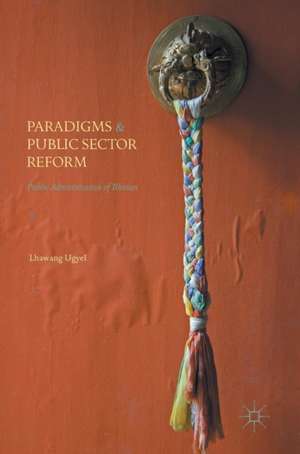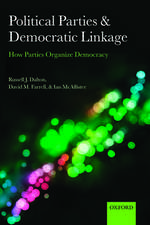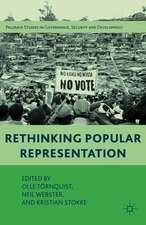Paradigms and Public Sector Reform: Public Administration of Bhutan
Autor Lhawang Ugyelen Limba Engleză Hardback – 17 oct 2016
| Toate formatele și edițiile | Preț | Express |
|---|---|---|
| Paperback (1) | 384.31 lei 6-8 săpt. | |
| Springer International Publishing – 27 iun 2018 | 384.31 lei 6-8 săpt. | |
| Hardback (1) | 389.31 lei 6-8 săpt. | |
| Springer International Publishing – 17 oct 2016 | 389.31 lei 6-8 săpt. |
Preț: 389.31 lei
Nou
Puncte Express: 584
Preț estimativ în valută:
74.49€ • 77.63$ • 61.68£
74.49€ • 77.63$ • 61.68£
Carte tipărită la comandă
Livrare economică 03-17 aprilie
Preluare comenzi: 021 569.72.76
Specificații
ISBN-13: 9783319402796
ISBN-10: 331940279X
Pagini: 285
Ilustrații: XI, 256 p. 13 illus.
Dimensiuni: 148 x 210 x 20 mm
Greutate: 0.45 kg
Ediția:1st ed. 2016
Editura: Springer International Publishing
Colecția Palgrave Macmillan
Locul publicării:Cham, Switzerland
ISBN-10: 331940279X
Pagini: 285
Ilustrații: XI, 256 p. 13 illus.
Dimensiuni: 148 x 210 x 20 mm
Greutate: 0.45 kg
Ediția:1st ed. 2016
Editura: Springer International Publishing
Colecția Palgrave Macmillan
Locul publicării:Cham, Switzerland
Cuprins
Chapter 1. Introduction.- Part I. Public Administration of Bhutan.- Chapter 2. Paradigms of public administration.- Chapter 3. Ideal types in public administration.- Chapter 4. Bhutan’s approach to public administration from modernisation to the new millennium.- Chapter 5. The Position Classification System and Bhutan’s public administration in a new era of governance.- Part II. Implementation and Evaluation of the Position Classification System Reforms.- Chapter 6. Evaluating the Position Classification System.- Chapter 7. Dynamics of the Position Classification System reforms.- Chapter 8. Dynamics of public sector reforms.- Chapter 9. Conclusion.
Notă biografică
Lhawang Ugyel is Research Fellow at the Australian National University (ANU). He completed his PhD from the ANU and Masters from Cornell University, USA. He worked in various capacities for the Royal Government of Bhutan: as Senior Human Resource Officer and Policy Analyst with His Majesty the King of Bhutan.
Textul de pe ultima copertă
‘This [book] is solid, coherent, original and adds to the corpus of knowledge. It is logically constructed, well written, based on original empirical research, from a case where little information is available’.
– Geert Bouckaert, Public Governance Institute, University of Leuven, Belgium
‘This is an outstanding [book] which significantly contributes to our knowledge both of public management (PM) reform (PMR) and of the administration of Bhutan… What I would single out as the [book’s] two most important features are its groundbreaking character, studying both an understudied and important topic (Bhutanese governance), and the [author’s] ability to rise above and advance current scholarly discourse on PMR, while still demonstrating that he is fully familiar with the latter.’
– Wolfgang Drechsler, Chair of Governance and Vice Dean for International Relations, Faculty of Social Sciences, Tallinn University of Technology, Estonia
‘A very important contribution both to the understanding of a very crucial problem in Bhutan and to developing a focus on this kind of problem in small-scale societies.’
– Mark Mancall, Emeritus Professor of Modern World History, Stanford University, USA
This book describes the administrative system of Bhutan. Divided into two main parts, the first part of the book describes the Bhutanese public administration by examining the various paradigms and ideal types of public administration. Chapters examine the paradigms and ideal types in the field of public administration, and the paradigm concept helps in explaining the dynamics and the interaction of the application of public sector reforms within the context of the ideal types. Based on the historical and recent reforms, the Bhutanese administrative system has been mapped onto the ideal type typology to show hybridity with a mix and layering of characteristics of paradigms.The second part of the book examines the dynamics of implementing and evaluating the Position Classification System (PCS). This part includes chapters which evaluate the PCS and discusses the dynamics of the reform. It synthesizes the findings of the implementation of the PCS and connects it to the broader discussions on public sector reforms. It discusses the trajectory of public sector reform and the points of convergences and divergences within this trajectory.
Lhawang Ugyel is Research Fellow at the Australian National University (ANU). He completed his PhD from the ANU and Masters from Cornell University, USA. He worked in various capacities for the Royal Government of Bhutan: as Senior Human Resource Officer and Policy Analyst with His Majesty the King of Bhutan.
Caracteristici
One of the first books to focus specifically on public administration in Bhutan Develops an ideal type typology for public administration in countries where a patronage system still operates Of interest to public administration scholars and policy practitioners
















